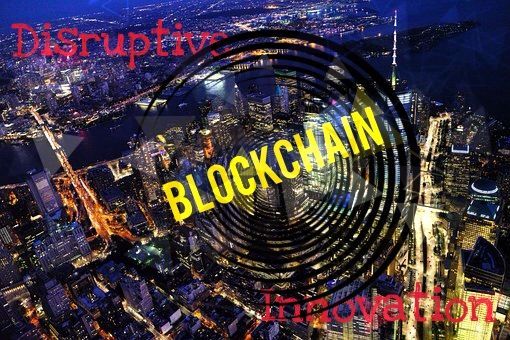Imminent global technological, social and economic disruptions enabled and caused by blockchain technology: Part 2(b)

How does blockchain technology and cryptocurrency fit with received innovation theories? Is crypto even disrupting processes of innovation? And what does this technology mean for the world?
This post is Part 2(b) of an ongoing work on the imminent global disruption enabled and caused by blockchain technology. It is my attempt to combine my knowledge of the field of innovation (from a business, government and theoretical perspective) with my observations about the current blockchain phenomena to answer the above questions.
Here's something you probably don't know about me. I have extensive experience writing and rolling out innovation policy in a government setting. So that means I know a bit about theories of innovation and what governments and businesses think they can do to harness it for economic and technological gain.
Please refer to the introduction (linked below through the Table of Contents) for further information, and note that I am not a financial adviser, and this is not financial advice.
TABLE OF CONTENTS
Introduction
The Introduction to this work was recently published on steemit.com. See: https://steemit.com/blockchain/@drwom/immanent-global-technological-social-and-economic-disruptions-enabled-and-caused-by-blockchain-technology-introduction
Part 1. Background: The cryptocraze
Bitcoin
Altcoins
A speculative bubble?
Part 1 of this work was recently published on steemit.com. See: https://steemit.com/blockchain/@drwom/imminent-global-technological-social-and-economic-disruptions-enabled-and-caused-by-blockchain-technology-part-1-background
Part 2. What's really going on? (See below)
a. Geopolitics
Part 2(a) of this work was recently published on steemit.com. See: https://steemit.com/blockchain/@drwom/imminent-global-technological-social-and-economic-disruptions-enabled-and-caused-by-blockchain-technology-part-2-a
2(b) Disrupting established business models and practices (see below):
Finance
Innovation: start-ups, angel investing and venture capital
Technology
Part 3. What does it mean? (To be posted over the coming days)
Where to from here?
How should governments respond?
How should business respond?
Please note: As this table of contents is a draft I expect it to change and expand as my ideas are developed.
PART 2 (b): WHAT'S REALLY GOING ON?
As mentioned in my previous post (Part 2 (a) - see link above) it doesn't take a futurologist to acknowledge the current reality - the internet is now ubiquitous in many fields of human endeavour - with some important qualifications: many under-developed nations still lack access.
However, where it exists in any meaningful way, the internet is all that blockchain technology needs to infiltrate and disrupt any activity which has been made easier/more reliable/more efficient/more profitable by being adapted to it.
What makes blockchain inevitable? It provides a level of security the internet has always lacked. That's what blockchain is, whether it's in plain sight, or anonymous and hidden from all but the sender and recipient, blockchain allows for incorruptible transactions.
Disrupting established business models and practices
And it is already happening. This very post, on steemit.com, is right here right now disrupting the huge and growing business that is called social media. How? By paying content providers like me, and all other steemit users, for our original work.
Finance
Blockchain's champion, Bitcoin, is famous as a cryptocurrency. And a currency is the most obvious - but hardly the only - use for blockchain technology. It's worth stating that the label "cryptocurrency" is an own goal by blockchain advocates. Limiting the technology in the popular mind to a currency has, I believe, contributed to the notion that investment in these "currencies" is contributing to an investment bubble. We even have have various luminaries arguing that buying Bitcoin isn't even an investment, because it isn't a real currency. Buying Bitcoin is therefore, to these people, purely speculative and without foundation.
The reality is that the world's antiquated financial systems are the lowest of low-hanging fruit for disruption by blockchain technologies. Anyone who has tried to send fiat currencies to different banks (even within the same country) knows how infuriatingly slow the process is. There is simply no excuse in this day and age for such delays. Secure, near instantaneous and virtually free exchanges are easy-peasy for blockchain tech (if not, perhaps, for Bitcoin).
Innovation: start-ups, angel investing and venture capital
Is blockchain technology disrupting the process of innovation? Well, the business model, certainly. ICOs - Initial Coin Offerings - i.e., selling tokens (coins, altcoins, cryptocurrencies) based upon a whitepaper is creating a way for new startup businesses to fund their endeavours and bypass the traditional model of angel investors, innovation incubators, and seeking funding through venture capital. Essentially cutting out the middlemen of the innovation pipeline is inherently risky for potential investors (token holders), as the traditional process, though frustratingly unwieldy and determined as much by sheer dumb luck as any other factor, served to maximise the "investability" of startups. They did this by ensuring the board had experience, the product was proven and could be scaled up, and the necessary contacts in the business world had been made (or at least approached).
With the ICO model, good ideas which may never have made it past the first hurdle under the traditional innovation development model can end up with millions of dollars with nothing to show for it - while having precious few legal worries regarding fraud etc. This is because of another major problem with the ICO model for investors - there is no legal recourse. Buyer beware. It's pretty much unrestrained and unregulated capitalism.
Technology
This is a no-brainer. Blockchain will become a serious enabler of innovation. This is next-level kind of stuff, because the disruptions caused by blockchains across every sector of human endeavour where the internet is currently a player (Finance. Economics. Arts. Design. Tourism. Business. Education.) will become further enablers of disruption.
So this is big. We are in the strange murky place in between two technological points. The future is here.
Part 3. What does it mean? coming soon.
Photo courtesy of pixabay.com and mashed by @DrWom


very good news and very useful for all stemmit users all over the world. I really like
Nice creative post, Keep it up &
Keep following @sohailomi
I really like your posts and I enjoy very much with all your posts.👍
Thank you for your research and explanations on topics that help each user.
Especially for some technical aspects that many like me still have sometimes difficult to understand.
Greetings to you @drwom.
Take Care
Peace&Unity
@Drwom The content of your post is awesome, i like it very much.
Its very useful information, thanks for sharing
Future coin Crypto! Coming to the front, what is it? Benefits and uses of Crypto.
See the Details Click
Thank You.
Increased trade protectionism, elevated economic policy uncertainty, the possibility of financial market disruptions - what does this all mean for business in 2018 http://ow.ly/e91J30hFrI4
nice post, thank you for informations :)